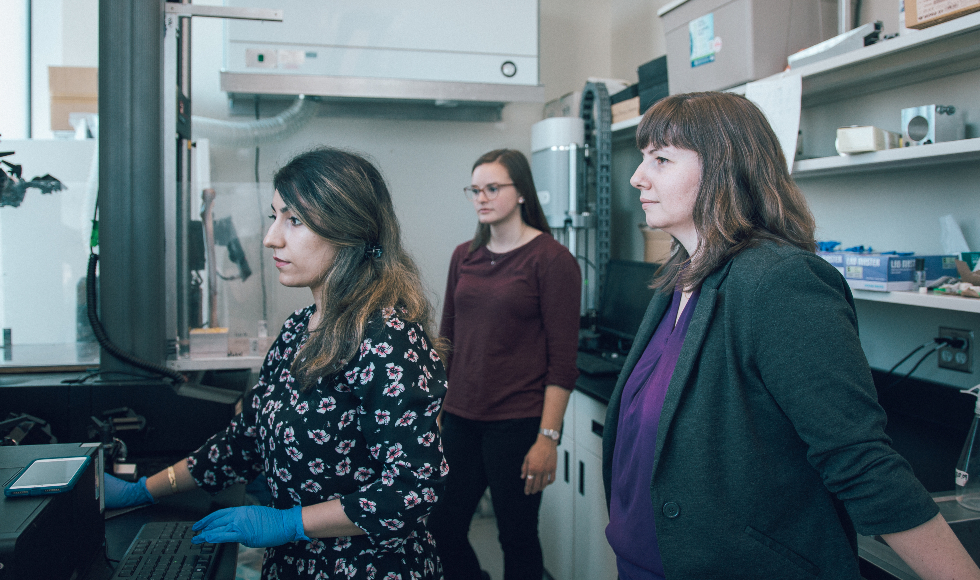Fostering undergraduate research

Cheryl Quenneville (far right) in her lab with two undergraduate students (Photo by Kareem Baassiri)
BY Kareem Baassiri
June 20, 2018
Mechanical engineering assistant professor Cheryl Quenneville has won the $25,000 Petro-Canada-McMaster University Young Innovator award. The award helps build a connection between research and teaching by engaging undergraduate students in research.
In this Q & A, Quenneville shares more details about her research, why she enjoys working with student researchers and how the award will support her students.
Q: What is your research about?
A: My research is on injury biomechanics. I am focused on causes of fracture and looking at how we can better protect people who are subjected to traumatic events (car crashes, falls, etc.). We are looking at the factors that may lead someone to sustain an injury and how we can best protect them, and repair them should they sustain one of those injuries.
Q: Why is it important to give students research opportunities?
A: Incorporating undergraduate students into my research is very important to me. It’s actually how I got into research myself, which then led me to pursue my Masters and PhD. There are a lot of fantastic undergraduate students who are interested in research, who come with new ideas, great enthusiasm and skills in programming and machining.
I’ve had the opportunity to work with a variety of undergraduate students. I’ve had students who are in health sciences programs, various engineering departments, as well as life sciences. I really like how they all bring diverse backgrounds.
Q: How will you use this moving forward in your future research?
A: The Petro-Canada and McMaster University award is a fantastic opportunity to bring more undergraduate students into my research. My plan is to incorporate them as summer students, as well as create a new research elective in Mechanical Engineering. This will give them the opportunity to work in a lab for 8 months with a supervisor, and really give them a preview of what graduate school would look like.
Q: What will students be working on as part of this project with you?
A: I want to give them exposure to the three main areas of my research program. The first area of research is on the causes that lead someone to sustain a fracture. They would be investigating factors such as posture, impact, speed and how that influences whether you have a broken bone or not. The second area is looking at developing new protective devices. These may be incorporated in a car to protect people in case of a collision, or when someone falls using new techniques such as 3D-printing which allows us to control the impact response of a device. The third area will be working with orthopedic surgeon collaborators and looking at fracture plates (internal devices that are placed surgically should someone be involved in a devastating facture). Unfortunately these fracture plates can lead to some long term issues such as arthritis in the joints. We are hoping to develop new and improved devices to reduce the incidents of the arthritis and give patients better outcomes.

Q: What impact will your research have?
A: I hope to better protect people from a variety of traumatic incidents, such as hard falls and broken hips with older adults, developing new protective systems in automotive and defense collisions. The ultimate goal is to improve patient outcomes through reducing the instances and severity of these injuries and to better protect society.
Q: How did you feel when you found out that you had received the Petro Canada Award?
A: I was so excited when I found out that I won the award. It’s very important to me to engage with students as early as possible. I find a lot of students approach me who are very enthusiastic about incorporating health aspects into engineering, and biomechanics is a fantastic way to do that. This award will give me the opportunity to hire and engage these students and really reach out to the students in a much more meaningful way.
Q: What’s the award timeline?
A: It’s a one year award. Should be done by June 2019. There are three undergrads who would like to take the research elective and work over the summer.


